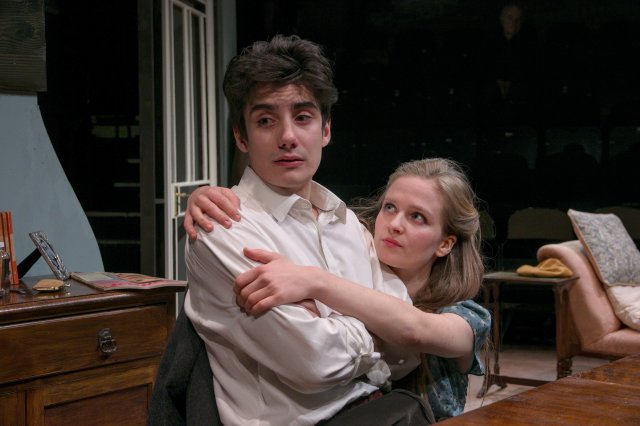Don’t Destroy Me at the Arcola Theatre – review
Tricia Thorns’s revival runs until 3 February at the north-east London venue

Michael Hastings wrote his first play Don’t Destroy Me, about a working-class Jewish refugee family in London, at the age of 18 when he was a tailor’s apprentice. It was performed at the New Lindsey Theatre Club, Notting Hill in 1956, shortly after John Osborne’s Look Back in Anger premiered at the Royal Court. Tricia Thorns’s thoughtful revival shows that this piece certainly was a significant achievement for a teenager, even if it is stronger in certain disparate elements than as a coherent whole.
The 15-year-old protagonist Sammy arrived in England from Hungary as a child with his father and stepmother (his mother died in childbirth) but was raised by his aunt in Croydon. He returns to his immediate family with whom he’s only had intermittent contact as he starts an apprenticeship in London. In this Brixton flat (a shabby-genteel design by Alex Marker) located in a lodging house where most of the tenants are Jewish, this sensitive soul enters an environment akin to a madhouse. It calls to mind the interwar novels of Patrick Hamilton, filled with alcoholism, mental illness and underlying violence among damaged people living in close quarters, and the menacing postwar kitchen-sink dramas of Arnold Wesker and Harold Pinter, Hastings’s fellow Jewish and more famous playwriting contemporaries.
Eddie Boyce (who resembles photos of the young Hastings) gives a performance of understated anguish as Sammy in their professional stage debut. His father, Leo (Paul Rider), is an alcoholic and a nihilist. Leo’s spirited much younger second wife Shani (Nathalie Barclay), who entered a marriage of convenience so she could leave Hungary and sneeringly refers to her husband as a “little man”, is having an affair with spivvy non-Jewish bookie neighbour George (Timothy O’Hara). “I like dirty things,” she comments. “They’ve got a sort of feeling.”
Alix Dunmore is particularly eye-catching with her fluttery performance as Mrs Pond, the dotty tea leaves-reading lady on the landing who is Miss Havisham-like in her delusions of multiple husbands. Her 17-year-old daughter, Suki (Nell Williams), with whom Sammy strikes up a friendship of sorts, seems to be heading the same way. Completely the mix, Sue Kelvin brings a much-needed grounding influence as salt-of-the-earth landlady Mrs Miller.
There are several repetitively discursive scenes and the writing falls down in its sketchy treatment of Judaism. Sammy has been raised as an observant Jew by his aunt but enters a godless environment. The Holocaust is never mentioned – perhaps because it’s too close to home that it doesn’t need saying but there’s much concern about the fee that’s charged for a visit from the Rabbi (Nicholas Day), suggesting a mercenary dimension. Setting up a tea party, akin to a royal visit, is evoked by a ballet with klezmer music, but ultimately the spiritual leader has to admit defeat.
On the strength of this play, Hastings became a protégé of George Devine at the Royal Court and it’s argued that he’s less celebrated than his contemporaries because of the diverse subject matter he tackled during his career. As a family drama set in a fascinating pressure-cooker environment, it demonstrates remarkable emotional maturity – focus and structure would surely be forthcoming.

















